|
|
|
Sort Order |
|
|
|
Items / Page
|
|
|
|
|
|
|
| Srl | Item |
| 1 |
ID:
135245


|
|
|
|
|
| Summary/Abstract |
This article explores the relationship between justice and effectiveness in bilateral and multilateral arms control negotiations. A set of hypotheses, derived from earlier research about the impacts of procedural and distributive justice on negotiation outcomes is evaluated. The sample consists of twenty cases, ten bilateral and ten multilateral. The results of statistical analyses show strong effects of procedural justice on the effectiveness of bilateral, but not multilateral, negotiations. Further analyses indicate that the effects are largely accounted for by half of the bilateral cases. Case-by-case analyses reveal some of the conditions that explain the correlation between pj principles and effective outcomes. Distributive justice correlated with more substantial agreements in the multilateral cases. Reasons for the limited effects of procedural justice on multilateral outcomes are discussed. The article concludes with more general implications and suggestions for further research.
|
|
|
|
|
|
|
|
|
|
|
|
|
|
|
|
| 2 |
ID:
105643
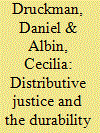

|
|
|
|
|
| Publication |
2011.
|
| Summary/Abstract |
This study explores the relationship between principles of distributive justice (DJ) and the durability of negotiated agreements. Sixteen peace agreements negotiated during the early 1990s were coded for the centrality of each of four principles of DJ - equality, proportionality, compensation, and need - to the core terms of the agreement. The agreements were also assessed on scales of implementation and durability over a five-year period. Another variable included in the analysis was the difficulty of the conflict environment. These data were used to evaluate three sets of hypotheses: the relationship between DJ and durability, the role of the conflict environment, and types of DJ principles. The results obtained from both statistical and focused-comparison analyses indicate that DJ moderates the relationship between conflict environments and outcomes: when principles of justice are central to an agreement, the negative effects of difficult conflict environments are reduced; when principles are not central, the negative effects of difficulty are heightened. These relationships are accounted for primarily by one of the four DJ principles - equality. Implications of these findings are discussed along with a number of ideas for further research.
|
|
|
|
|
|
|
|
|
|
|
|
|
|
|
|
| 3 |
ID:
058984
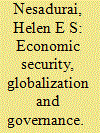

|
|
|
| 4 |
ID:
113819
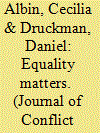

|
|
|
|
|
| Publication |
2012.
|
| Summary/Abstract |
This article explores relationships between procedural justice (PJ) in the negotiation process, distributive justice (DJ) in the terms of negotiated agreements, and their durability in cases of civil war. Adherence to PJ principles was found to correlate strongly with agreements based specifically on the DJ principle of equality. Agreements were also found to be more durable when based on equality, but not when based on other DJ principles. The equality principle accounted for the relationship between PJ and durability irrespective of differences between the parties in power. Further examination suggested that two types of equality in particular-equal treatment and equal shares-were associated with forward-looking agreements and high durability. The findings suggest that durability is served by including equality in the terms of agreements, and that PJ helps (but does not guarantee) achieving such agreements.
|
|
|
|
|
|
|
|
|
|
|
|
|
|
|
|
| 5 |
ID:
048142
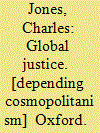

|
|
|
|
|
| Publication |
Oxford, Oxford University Press, 1999.
|
| Description |
xiii, 249p.
|
| Standard Number |
0198294808
|
|
|
|
|
|
|
|
|
|
|
|
Copies: C:1/I:0,R:0,Q:0
Circulation
| Accession# | Call# | Current Location | Status | Policy | Location |
| 042609 | 330.1/JON 042609 | Main | On Shelf | General | |
|
|
|
|
| 6 |
ID:
093239
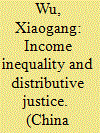

|
|
|
|
|
| Publication |
2009.
|
| Summary/Abstract |
Over the past decades income inequality has been sharply increasing in both mainland China and Hong Kong, two Chinese societies that have distinct paths of institutional development. While previous studies on income inequality have attempted to document the trend and investigate its causes, this article focuses on people's perceptions of legitimate income inequality and how these perceptions are related to their attitude towards inequality. Analyses of data collected in separate population surveys in China (2005) and Hong Kong (2007) reveal a higher degree of tolerance of income inequality and a higher degree of perceived fairness of income distribution in Hong Kong than in the mainland. In both societies, such normative support for income inequality is positively associated with people's perceptions of opportunities.
|
|
|
|
|
|
|
|
|
|
|
|
|
|
|
|
| 7 |
ID:
164155
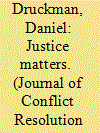

|
|
|
|
|
| Summary/Abstract |
Attaining durable peace (DP) after a civil war has proven to be a major challenge, as many negotiated agreements lapse into violence. How can negotiations to terminate civil wars be conducted and peace agreements formulated to contribute to lasting peace? This question is addressed in this study with a novel data set. Focusing on justice, we assess relationships between process (procedural justice [PJ]) and outcome (distributive justice [DJ]) justice on the one hand and stable agreements (SA) and DP on the other. Analyses of fifty peace agreements, which were reached from 1957 to 2008, showed a path from PJ to DJ to SA to DP: The justice variables were instrumental in enhancing both short- and long-term peace. These variables had a stronger impact on DP than a variety of contextual- and case-related factors. The empirical link between justice and peace has implications for the way that peace negotiations are structured.
|
|
|
|
|
|
|
|
|
|
|
|
|
|
|
|
| 8 |
ID:
155695
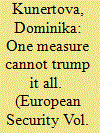

|
|
|
|
|
| Summary/Abstract |
This paper calls for a qualitative turn in discussing NATO burden-sharing. The paper takes issue with the numerical burden-sharing narrative in NATO and identifies its two main problems. Despite being simple, the 2% defence spending pledge lacks other basic attributes of any contributory system: fairness and effectiveness. Drawing from concepts of distributive justice, the paper analyses NATO’s first burden-sharing debates and demonstrates that due to their qualitatively different capabilities, the allies agreed on an egalitarian ability-to-pay distributive justice. Furthermore, it shows that the allies refrained from implementing fairness in terms of a one-size-fits-all formula, since this simple numerical approach could not produce fair and effective burden-sharing at the same time. Rather, they developed a dynamic framework for optimal sharing. These formative burden-sharing debates provide valuable lessons learned for the current build-up of NATO’s posture: less focused on formal sharing, more concerned with strategic outputs.
|
|
|
|
|
|
|
|
|
|
|
|
|
|
|
|
| 9 |
ID:
190735


|
|
|
|
|
| Summary/Abstract |
The world ocean is a continuum that facilitates relatively free interchange among its parts and is of fundamental importance to studying environmental justice. Environmental justice sits within the larger ambit of social justice and equity. The article examines the effects of illegal, unreported, and unregulated (IUU) fishing within the Indian Ocean Region (IOR) on sustainability, and damage to the marine ecology, resulting in environmental and distributive injustice to the coastal communities. It also highlights the prevalence of IUU fishing on the high seas and in the exclusive economic zones (EEZ) of the coastal States vis-à-vis existing international fisheries laws. In addition, the article analyses the feasibility of managing the marine environment in the IOR through people’s participation, utilising the tenets of Commander’s Estimate of the Situation (CES), and suggests courses of action (CoAs) to achieve environmental justice. Further, it makes use of three case studies to assess the feasibility of people's participation in achieving sustainable fishing practices.
|
|
|
|
|
|
|
|
|
|
|
|
|
|
|
|
| 10 |
ID:
160289
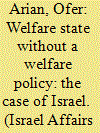

|
|
|
|
|
| Summary/Abstract |
Israel was established as a welfare state that sought to provide social justice to its citizens. From 1948 to the late 1970s the political system was run by a social-democratic party that envisioned the creation of a ‘just’, ‘egalitarian’ and ‘inclusive’ society. In 1977, the Likud party gained power and Israelis expected the new government to change the rules of the game, removing existing welfare systems and drastically reducing government control of the economy. Though very few, if any, of the anticipated changes were carried out, broad sectors of the Israeli public believed that the Likud government had changed the face of the Israeli economy and society. This article examines the characteristics of the Israeli welfare system and suggests an explanation for the gap between the way it is viewed and what exists on the ground
|
|
|
|
|
|
|
|
|
|
|
|
|
|
|
|
|
|
|
|
|